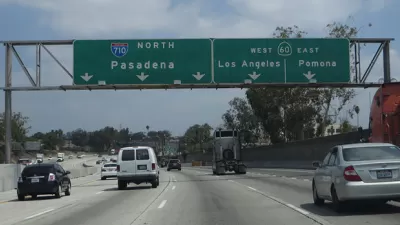When it comes to public transportation, walkable commercial districts, and supporting the arts, Pasadena has some things figured out.
Many credit the leadership of widely-admired Mayor Bill Bogaard with the city's successes in these areas. After the recent announcement that he will not run for office in 2015, he sat down with The Planning Report to reflect on 16 years of service.
In discussing Pasadena's recently improved transit options, its diverse neighborhood offerings, and its longstanding practice of public engagement, Mayor Bogaard shares strategies that have yielded desirable results. He goes on to note the city's commitment to job creation in science and technology, along with its focus on the arts. Finally, he comments on the challenges remaining for Pasadena and the responsibilities facing his successor.
Bogaard explains one municipal approach he stands by, "Our split of services acknowledges explicitly the difference between economic development and the planning function. There can be a conflict when the person responsible for encouraging companies to come or supporting new investment that involves large buildings is also responsible for administering the zoning code. There is sometimes a temptation not to apply zoning requirements with the strictness called for by the plan or by the community’s expectation. Development in Pasadena is directly under the city manager. He and his team are working very hard to make Pasadena highly attractive to new investment through expansion of existing companies and arrival of new companies. At the same time, a separate team is pursing the General Plan update."
FULL STORY: An Early TPR Exit Interview: Mayor Bogaard's Impressive Leadership of Pasadena

Maui's Vacation Rental Debate Turns Ugly
Verbal attacks, misinformation campaigns and fistfights plague a high-stakes debate to convert thousands of vacation rentals into long-term housing.

Planetizen Federal Action Tracker
A weekly monitor of how Trump’s orders and actions are impacting planners and planning in America.

In Urban Planning, AI Prompting Could be the New Design Thinking
Creativity has long been key to great urban design. What if we see AI as our new creative partner?

King County Supportive Housing Program Offers Hope for Unhoused Residents
The county is taking a ‘Housing First’ approach that prioritizes getting people into housing, then offering wraparound supportive services.

Researchers Use AI to Get Clearer Picture of US Housing
Analysts are using artificial intelligence to supercharge their research by allowing them to comb through data faster. Though these AI tools can be error prone, they save time and housing researchers are optimistic about the future.

Making Shared Micromobility More Inclusive
Cities and shared mobility system operators can do more to include people with disabilities in planning and operations, per a new report.
Urban Design for Planners 1: Software Tools
This six-course series explores essential urban design concepts using open source software and equips planners with the tools they need to participate fully in the urban design process.
Planning for Universal Design
Learn the tools for implementing Universal Design in planning regulations.
planning NEXT
Appalachian Highlands Housing Partners
Mpact (founded as Rail~Volution)
City of Camden Redevelopment Agency
City of Astoria
City of Portland
City of Laramie



























